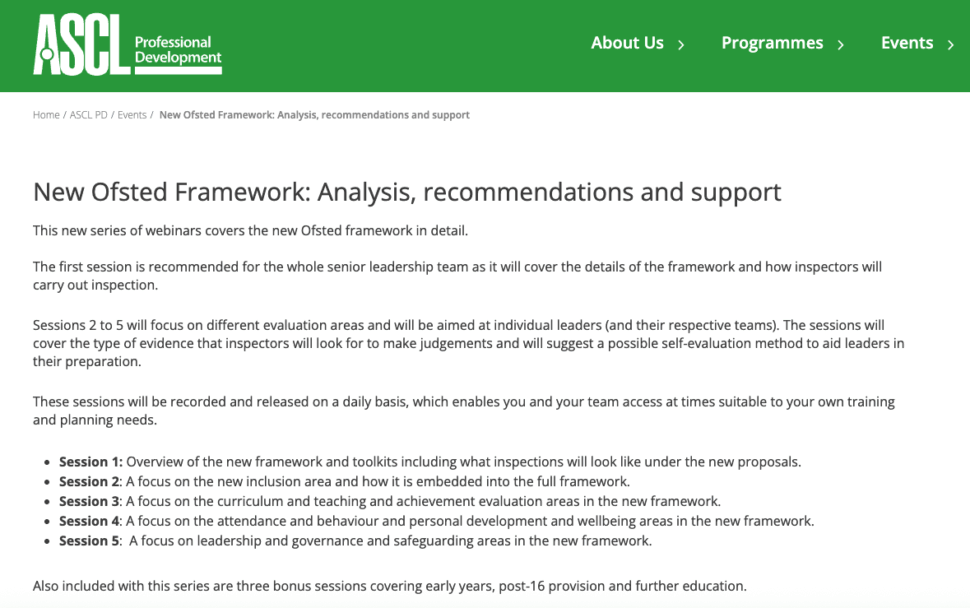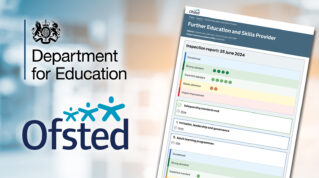A union which criticised an “unhelpful cottage industry around preparing for inspections” is running its own webinars to help leaders prepare for Ofsted report card visits – at nearly £150 per school or college.
In a policy paper published in 2023, the Association of School and College Leaders called on Ofsted to publish inspector training materials to “dispel myths about what Ofsted wants and reduce the unhelpful cottage industry which has grown up”.
The watchdog now publishes training materials on its Ofsted Academy website, and is running free webinars for the sector on its new report cards, due to be introduced next month.
But ASCL said schools and colleges are still clamouring for more information on how report cards will work, caused by the short timeline between final plans being revealed last month and the restart of inspections in November.
The union is now advertising its own webinars with “analysis, recommendations and support” on the inspections.
One session will cover “the type of evidence that inspectors will look for to make judgements and will suggest a possible self-evaluation method to aid leaders in their preparation”.
The cost for five sessions is £120 plus VAT per school or organisation.
Three “bonus sessions” covering early years, post-16 provision and further education are also included in ASCL’s webinar series.

Ofsted ‘strongly discourages’ paying for prep
When asked about the ASCL webinar, an Ofsted spokesperson said: “We strongly discourage schools spending their limited resources on training materials that purport to prepare them for inspection.
“Ofsted recently hosted a series of free webinars for every different kind of education provider, where we explained first-hand what they can expect from the new approach to inspection.
“Many thousands of education professionals attended, and we are uploading all of the recordings onto our YouTube channel, where they can be watched back any time – for free.”
But Pepe Di’Iasio (pictured), ASCL’s general secretary, said Ofsted’s “determination to rush through the implementation of a significantly changed inspection system has given schools and colleges little time to prepare for a new set of high-stakes hurdles”.
He added: “We have already endeavoured to meet this need by providing information and answering questions about the new framework through our regular communication channels. This is, of course, provided without charge as part of our normal service to our members.
“It is clear that some schools and colleges are seeking a more extensive programme of practical support and as a trusted source of high-quality professional development provision we felt that it was right for us to make that available through our Ofsted webinar series.”
The union charges annual membership fees from £258 for business managers up to £486 for executive heads or CEOs.
Di’Iasio said the “substantial programme” works out at £24 per session and is recorded so it can be shared. “We think this delivers good value and provides a cost-effective option,” he added.
Ofsted has long complained about consultants selling schools and colleges training on inspections.
In a 2018 blog titled ‘The myth of Ofsted consultants: do not buy the snake oil’, former national director for education Sean Harford said the “lucrative industry that sells schools consultation into ‘what Ofsted wants’ and ‘preparation for Ofsted’ seems to thrive”.
“Please, do not hand your silver to these Mystic Megs,” he added.
Under reforms following the death of headteacher Ruth Perry, the Ofsted Academy was set up to publish materials relating to inspector training.
The watchdog said this would “open up Ofsted to those we inspect, and pass on what we know”.
“We will become increasingly transparent about what we do by sharing our training in context and making our processes visible,” Ofsted stated on its website.
Despite this, schools were still contacted by consultants looking to sell training around new report card inspections earlier this year – even before final plans were published.
Speaking to TES about the issue in March, Di’Iasio said this practice was “a sign of just how high-stakes the inspection system is”.
The union said it continued to “call on Ofsted and the government to rethink the five-point grading scale and timetable for implementation as we are deeply concerned about the pressure this places on leaders and their staff with detrimental consequences for their wellbeing”.
















Your thoughts